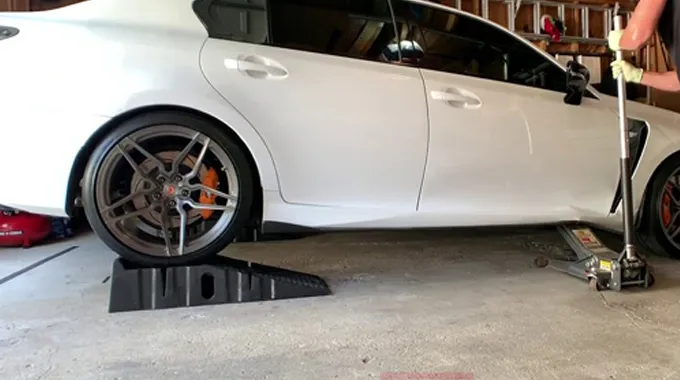Last Updated on April 17, 2023
Car jacks are an indispensable accessory for anyone who spends a significant amount of time working on their car. They allow you to quickly and easily raise your car off the ground, giving you the clearance you need to perform repairs or maintenance.
If you take care of it according to the instructions, a jack-stand is unlikely to fail. If you rely on a car jack, it’s very important to be prepared for the possibility that it may fail.
The chances of the car jacks failing depends on the 2-post lift and 4-post lift, as well as other factors. So, always have a backup plan in place, such as another jack or a set of jack stands.
That way, if your jack does fail, you can still get the job done. In this write-up, we’ll look at how often car jacks fail and what you can do to prevent them so that you can avoid being stranded with a broken-down car.
How Often Do Car Jacks Fail: Explained
The most widely used type of car jack is the 2-post lift. These lifts are durable and can last for decades with good maintenance, so they are not likely to fail. 4-post lifts are also very durable and can have a lifespan of 20 years or more.
Of course, the lifespan of a car jack will fail depending on how often it is used. A jack that is used daily will not last as long as one that is only used occasionally. With regular use and maintenance, a car jack can be a lasting investment for any garage or workshop.
What Causes Car Jacks To fail?
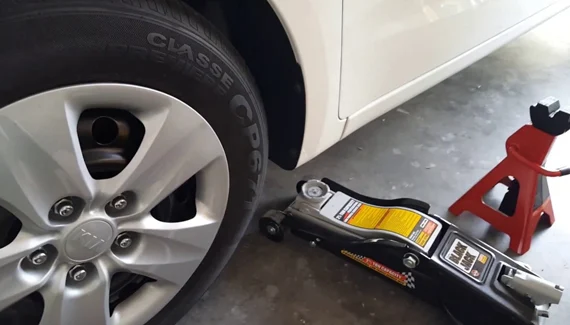
Some of the reasons why car jacks fail are listed below, along with tips for preventing them:
Manufacturing Defects
This is one of the main causes of car jack failure. In some cases, jacks are made with faulty materials that break under stress. In other cases, jacks are not assembled correctly, resulting in loose bolts or other problems.
Whatever the cause, manufacturing defects can lead to car jacks that fail when they are needed most. It is important to inspect any new jack before using it and to discontinue use if any defects are found. By taking these precautions, you can help to ensure that your car jack will be there when you need it.
Overload
Overloading a car jack stand can cause the metal to deform, which in turn can lead to the stand collapsing and car jack failing. When this happens, the car’s weight is suddenly released, which can cause severe injury or even death. Therefore, it is essential to use jack stands that are rated for the weight of your car and never exceed the maximum load limit.
If you are unsure about how much weight your jack stand can support, it is always better to err on the side of caution and use a stronger stand. Remember, your safety is always more important than saving a few dollars.
Uneven Surface
When you use a car jack to lift your vehicle, it’s essential to ensure that the jack is stable. If the stand is placed on an uneven or soft surface, it can sink into the ground and become unstable, which can cause the jack to fail. This can lead to severe injury or property damage.
Always place the jack on a level surface, such as a garage floor or concrete driveway, to avoid this. You can also use Jack stands to support your vehicle while it’s lifted. These stands are designed to be placed on level surfaces and provide additional stability to prevent your car from sinking or tipping.
Secured Improperly
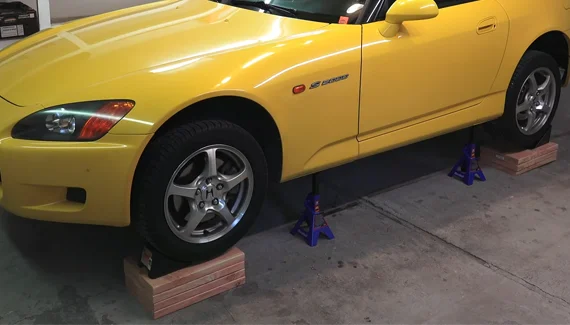
One of the most widespread mistakes is not properly securing the jack before attempting to lift the car. If the jack is not firmly attached to the car, it can easily slide out from under the vehicle, causing it to fall. This can be extremely dangerous, and it can also damage the car. It is vital to check that the jack is securely in place before lifting the vehicle.
Another typical mistake is using too much force when trying to raise the car. Many people think they need to use all their strength to lift the vehicle, which may cause the jack to fail. You should only use enough force to slowly and steadily raise the car. Following these simple tips, you can safely use a car jack without risking injury or damage to your vehicle.
Improper Usage
One recurring reason for car jacks to fail is improper usage, such as using the inappropriate type of jack for your vehicle or not following the instructions correctly when lifting your vehicle. For example, many people mistakenly use floor jacks on vehicles that are not meant to be lifted from the underside.
This can put too much strain on the jack and cause it to break or collapse. Similarly, using a jack that is not intended for your vehicle can also lead to failure. For instance, using a floor jack on a truck would not work because the truck is too heavy and the floor jack would not be able to lift it.
It’s important to be familiar with the proper use of car jacks and to follow all safety instructions before using one. Otherwise, you run the risk of damaging your car or injuring yourself.
Deterioration
Just like any other tool, car jacks experience degradation over time. This is especially true if you use your jack often or don’t store it properly when not in use. Rusting and corrosion are also major problems that can weaken a jack’s structure and make it more likely to fail when in use.
Over time, the hydraulic fluid that helps to lift your car can also leak out, making the jack-less effective. For these reasons, it’s essential to inspect your jack for any damage regularly and ensure that it’s properly lubricated. With some attention, you can help extend your jack’s life and ensure it’s always ready when you need it.
Are all car jack stands the same?
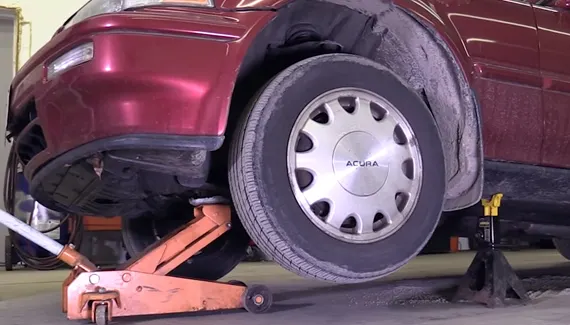
All car jacks work by lifting your vehicle off the ground. This gives you clearance to change a tire, or to work on other parts of the car that are difficult to reach when the vehicle is sitting on the ground without failing. The three main types of car jacks are the trolley jack, bottle jack and scissor jack. Each one works slightly differently, but they all serve the same purpose.
Trolley jacks
Trolley jacks are perhaps the most frequent type of jack. They have four wheels, which allow you to roll the jack under your car. Once it’s in position, you use a handle to pump the jack up and down, raising or lowering the platform your car is sitting on. Trolley jacks are fairly stable, but they can be knocked over if you’re not careful.
Bottle Jack
Bottle jacks are similar to trolley jacks, but they have a more compact design. They’re often used for changing tires on larger vehicles, such as trucks and SUVs. Like trolley jacks, bottle jacks use a handle to raise and lower the platform that your vehicle stands on. Because they’re more compact, they can be more difficult to position under your car.
Scissor Jack
Scissor jacks are the simplest type of jack. They consist of two metal plates that open and close like scissors. To use a scissor jack, you simply place it under your car and turn a knob to raise or lower the platform your car sits on. Scissor jacks are very user-friendly, but they’re also less stable than trolley jacks or bottle jacks. For this reason, scissor jacks are typically only used for tire changes or making minor repairs.
Should I use 4 jack stands?
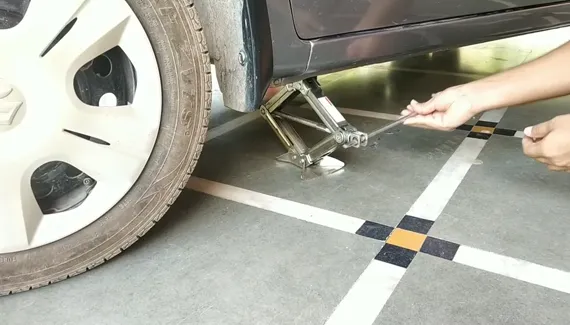
You’ll need two jack stands if you’re only lifting one end of the car. This will provide support and prevent the vehicle from shifting or toppling over. Of course, you’ll also need a good-quality jack that can support the load of your car. You can work on your car safely without putting yourself at risk by not experiencing car jack failure.
If you’re lifting the entire car, it’s best to use four jack stands. This will provide excellent stability and prevent the car from shifting or tipping. Taking the right precautions and using the right machinery will help you work on your car safely.
Don’t Forget to Maintain Your Car Jacks
As we’ve seen, car jacks can fail easily if they’re not used or maintained correctly. By being aware of the leading causes of failure, you can help prevent your own jack from failing when you need it most.
These simple tips can help you get the most out of your car jack. Hopefully this article was helpful. If you have any questions or if you would like to share your own tips for preventing car jack failure, please leave a comment below.
